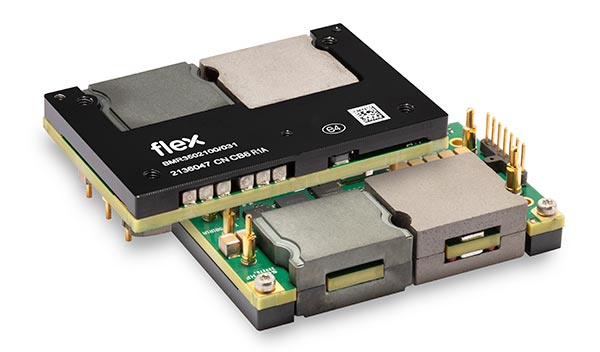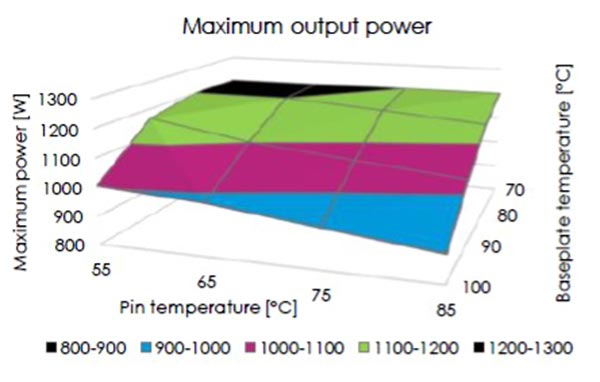 Flex Power Modules is introducing the BMR350, a quarter-brick, non-isolated DC/DC converter rated at 860 W continuous and 1200 W peak power, ideal as an intermediate bus converter for powering processors and ASICs with peak power demands. The product features an input of 40-60 V (80 V/100 ms) and a fully regulated output of 12 V at 100 A maximum, adjustable from 8 V to 13.2 V. An innovative transformer-coupled, non-isolated topology reduces component count and current stress and yields an efficiency level peaking at > 97.8% at half load 48 V input voltage. Derating for the BMR350 is characterized by the innovative Flex Power Modules 3D thermal data graphs which specify available output power for given real-world pin and baseplate temperatures up to 100°C, with the user’s airflow rate. This enables maximum power to be extracted without stress to the converter.
Flex Power Modules is introducing the BMR350, a quarter-brick, non-isolated DC/DC converter rated at 860 W continuous and 1200 W peak power, ideal as an intermediate bus converter for powering processors and ASICs with peak power demands. The product features an input of 40-60 V (80 V/100 ms) and a fully regulated output of 12 V at 100 A maximum, adjustable from 8 V to 13.2 V. An innovative transformer-coupled, non-isolated topology reduces component count and current stress and yields an efficiency level peaking at > 97.8% at half load 48 V input voltage. Derating for the BMR350 is characterized by the innovative Flex Power Modules 3D thermal data graphs which specify available output power for given real-world pin and baseplate temperatures up to 100°C, with the user’s airflow rate. This enables maximum power to be extracted without stress to the converter.
For higher power levels, active current sharing between paralleled modules is an option. The BMR350 meets EMI standard EN 55032/FCC part 15J ‘Class B’ with a recommended external filter.
Full protection is included against output over-voltage, over-current and module over-temperature and a PMBus® interface provides remote control and monitoring, supported by the ‘Flex Power Designer’ software tool. A particular feature is the inclusion of an ‘event data recorder’ which can be interrogated for analysis of stress conditions before converter shut-down.
The BMR350 is in the standard quarter-brick format of 58.4 x 36.8 mm footprint with a height of just 12 mm, which includes the integrated baseplate with its threaded fixing holes. Terminations are via through-hole pins, suitable for pin-in-paste reflow, wave or manual soldering and positions are compatible with similar products on the market.
Anders Sellin, Product Manager Flex Power Modules comments “We have adopted a novel approach with the BMR350 with its transformer-coupled, non-isolated topology. This keeps costs and component stresses low without compromising efficiency”.
The product will be available in OEM quantities in the end of quarter 1/2022 and more variants will follow during 2022.



